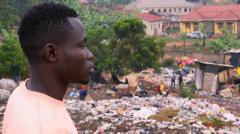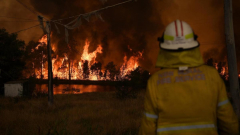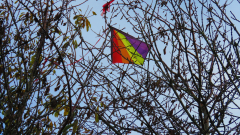Hasham Cheema
BBC News, Kampala
BBC
Fighting back the tears, 22-year-old rubbish collector Okuku Prince recalls the moment his best friend’s lifeless body was found at a massive rubbish dump in Uganda’s capital, Kampala.
The landslide at the Kiteezi dump last August killed 30 people, including his friend Sanya Kezia.
“I think some people are still underneath the garbage,” he tells the BBC.
Many of them eked out a living by washing and selling whatever discarded items they found that still had value – anything from fishing nets to plastic bottles, glass jars and the components of old electronic devices.
A blame-game erupted after the fatal collapse, with Kampala’s city council and central government accusing each other of negligence, while some of the dead still languished under tonnes of rubbish without the dignity of a burial.
When government tractors did eventually dig up Kezia’s body, there were injuries to the 21-year-old’s face.
It was horrifying for his friend to see him enveloped by stinking, rotting waste.
“We’re not safe here. Unless they [repair] it, maybe level it. Otherwise, people are not safe,” says Mr Prince, who before becoming a rubbish-picker had been studying law at the Islamic University of Uganda.
AFP
The collapse at the dump site followed weeks of torrential rain
Unable to afford tuition fees after his family became financially unstable, his daily routine is now a far cry from libraries and lecture halls.
Youth unemployment is at crisis levels in Uganda, and there are many like Mr Prince who often risk their health and abandon their dreams just to make a living.
“I come here to the dump in the morning, collect polythene bags, take them for washing and sell them,” says Mr Prince. “I make 10,000 shillings [equivalent to $2.70 or £2.10] a day.”
The collapse has left him in further financial distress as he used to live by the side of the dump – but has had to move because of safety concerns.
The houses of others were also destroyed during rescue operations.
Compensation money has been paid to the families of those who died, but not to around 200 people who lost their homes, local authorities have admitted to the BBC.
Officials are “waiting for the valuation and budget allocation”, says Dr Sarah Karen Zalwango, the new head of public health and the environment at the Kampala Capital City Authority (KCCA).
Some argue that the Kiteezi col
Read More





